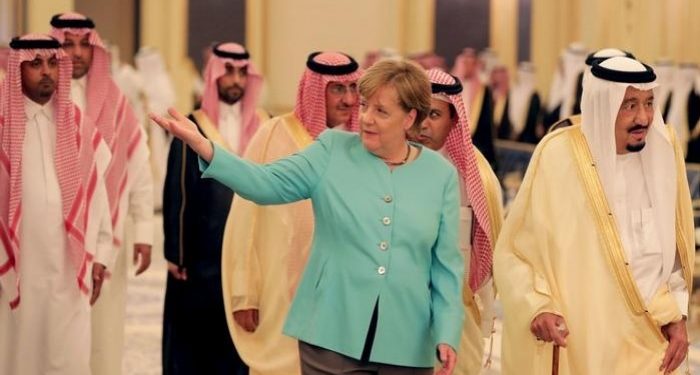
Germany shocked the Saud regime by announcing the extension of the arms embargo on the Kingdom for an additional nine months despite the official request recently submitted by the regime.
A spokesman for the German government said that the period of banning the export of arms to the Kingdom will continue until the end of this year at the very least.
The official stated that the German government will not accept any request it receives from the Kingdom regarding the purchase of weapons, before the end of the ban period.
It is noteworthy that the German government decided to ban the export of arms to Saudi Arabia in November 2018, against the background of the killing of journalist Jamal Khashoggi in the Saudi consulate in Istanbul on October 2 of the same year, and the continuous criticism of the kingdom’s war in Yemen.
Last month, diplomatic sources in Germany ruled out the authorities ’approval of the Saudi regime’s request to lift the two-year-old ban on supplying weapons to the Kingdom.
The Kingdom is the third largest importer of weapons in the world, but the Saudi regime does not suffice and says that it needs German weapons to defend the Kingdom.
The Foreign Minister of the Saudi regime, Faisal bin Farhan Al Saud, had called on the German government to end the moratorium on arms exports on the Kingdom in protest of the Yemen war and the murder of journalist Jamal Khashoggi more than a year ago.
Bin Farhan said in an interview with German news agency published that he hoped “Germany will understand that we need means to defend ourselves,” referring to the attacks on oil facilities in Saudi Arabia last year, blaming Iran for its responsibility.
He added that the German government’s continued non-issuance of permits to supply weapons to the Kingdom is inappropriate in the context of the good relations between the two countries.
It is noteworthy that the parties of the German ruling coalition consisting of the Christian alliance to which Chancellor Angela Merkel and the Social Democratic Party agreed in March 2018 in the coalition treaty to stop exporting weapons to the countries directly “involved” in the Yemen war, which included the Kingdom.
The Saudi regime faces a lot of trouble in refuting international reports that prove its involvement in committing hideous massacres against civilians in Yemen with weapons that the regime buys from western countries with deals exceeding billions.
Observers believe that the Saudi regime is trying to break its international isolation by resuming importing weapons from active European powers by promoting talk about a defense policy against Iran and its supporters in the region.
But it is clear that the regime is completely contradicting itself by talking about defensive policy at a time when Crown Prince Mohammed bin Salman previously promised that the Kingdom “will not wait for Iran’s attack on it, but rather that the battle will be in the heart of Tehran.”
Observers also believe that the Saudi regime is trying to raise the issue of importing weapons from Germany in an attempt to disrupt the movements of international human rights organizations against the Saudi Arabian sea ship Yanbu to prevent it from delivering death shipments to civilians in Yemen.
The facts show that the huge weapons owned by the Kingdom and the air defense systems that it bought with hundreds of billions of dollars did not enable them to protect themselves from the Houthi drones. They did not achieve any victory, which raises questions about the reason for the regime’s insistence to continue armaments and spend more money.
For his part, the former German diplomat, Gunter Mulck, ruled out that Germany would respond to the request of the Saudi regime to lift the ban on selling weapons to it, and rejected Riyadh’s justifications for its weapons to self-defense, noting that it possesses huge quantities of American weapons and air defense systems, as well as the presence of American forces in Saudi Arabia and the region to protect it.
And Mulk considered in television statements that the request of the Saudi regime from Germany to lift the arms embargo on his country is neither logical nor justified, stressing that the argument of self-defense no longer fools anyone.
The German diplomat warned the Kingdom against using its hostility with Iran to obtain German weapons, and said that Berlin would not accept that Riyadh go hostile against Tehran, thus fueling the conflict in the region.
And the German diplomat ruled out his country’s approval to sell its weapons again to Saudi Arabia, given the consensus of the Socialist and Christian parties to reject this matter, and the strong opposition to German public opinion, due to the crimes that Riyadh committed against civilians through the war it was fighting in Yemen.
Gunter noted that Germany – under French and British pressure – had agreed to resell jointly manufactured weapons to the Kingdom, but it would not accept Riyadh to sell German pure weapons.